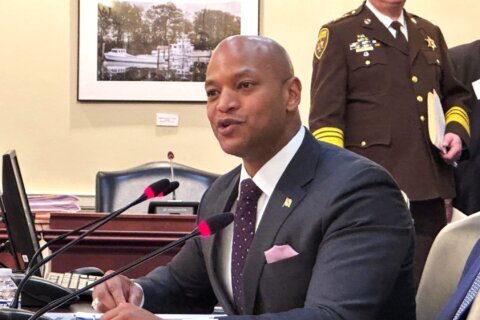This article was republished with permission from WTOP’s news partners at Maryland Matters. Sign up for Maryland Matters’ free email subscription today.
Gov. Wes Moore (D) signed a suite of justice reform bills into law Tuesday that will make it easier for long-serving inmates to apply for parole, make age and illness a factor in parole considerations and streamline the process for people seeking to expunge their records after serving their time.
The bills, some of which advocates have been pushing for years, demonstrate what House Speaker Adrienne Jones (D-Baltimore County) called the legislature’s ongoing efforts “to create a more equitable criminal justice system” in a state that “incarcerates the highest percentage of Black people in the country.”
“So this year, we passed several bills to address these statistics, including the Second Look Act, the governor’s Expungement Reform Act, and legislation to improve the medical parole process,” Jones said at Tuesday’s bill-signing, the second since the end of the 2025 legislative session.
Jones, Moore and Senate President Bill Ferguson (D-Baltimore City) signed 142 bills into law Tuesday. They included a measure aimed at protecting federal workers from Trump administration budget cuts and another aimed at protecting the state from the potentially crushing financial burden of lawsuits brought by people who were abused as children while in state custody, after a then-hailed change to state law in 2023 made it easier to bring such suits.
Moore touted Senate Bill 432, the Expungement Reform Act, which was part of his legislative agenda. Advocates say that criminal records can prevent people from getting jobs, loans or housing, no matter how long ago the crime was committed, but that the process for expunging a criminal record can be cumbersome and sometimes impossible.
“We know, that for too many Marylanders, their criminal record … is tied around their necks for life. They cannot get a loan, they cannot get a home, they cannot get hired and oftentimes it’s because of an offense that they committed years, if not decades ago,” Moore said. “We have got to confront this myth that every sentence needs to be a life sentence.”
SB432 expands the current list of more than 100 crimes for which a person may seek expungement to include credit card theft, making a false statement to police and driving without a license, among others. It also corrects a technicality that made parole violations count against the successful fulfillment of a person’s sentence, effectively barring someone permanently from seeking expungement if they violated parole somewhere along the way.
“As soon as the bill becomes effective, I think you’re going to see some impact,” said Sen. Charles Sydnor III (D-Baltimore County), a co-sponsor of the act. “Right after the effective date, people that wouldn’t have been helped the day before are going to be helped, so there’s going to be immediate action.”
Officials also signed into law are measures aimed at giving people still serving time a shot at getting out on parole. Those measures were often the subject of emotional debate during the legislative session, and sometimes surprising personal stories from lawmakers talking about their own experiences as victims of crime.
House Bill 853, the Second Look Act, would give people who have been incarcerated for at least 20 years the ability to petition for a sentence reduction if they met several other criteria. It would not be available to sex offenders, people sentenced to life without chance of parole, those who were older than 25 when they committed their offense or those convicted of killing a first responder.
The last criterion was one of a series of disqualifying crimes that opponents of the bill offered as amendments, all of which failed except for the first responder amendment. It was accepted by the Senate in the waning days of the legislative session, threatening to derail the bill, but the House accepted the change and gave final approval to the bill after years of trying by advocates.
Del. Cheryl Pasteur (D-Baltimore County) said at the time that she was not a fan of the amendment, but was willing to accept it to get the Second Look Act on the books.
“It’s just a good and promising start,” Pasteur said after Tuesday’s bill signing. She predicts that the bill will do more than help the incarcerated individuals who might have their sentences shortened, but will benefit communities as well. “For those that come out, just think of how they can positively interact with the young people.”
Critics had argued, some passionately, that allowing inmates to petition for a sentence reduction would deny justice to the victims, and force them to relive the crimes again years later. They argued that people who had committed particularly heinous crimes did not deserve a second chance.
Supporters of the bill said repeatedly that it is not a “get out of jail free” card, but just a way to give a second chance to inmates who have turned their lives around and might be able to contribute to society. The petitions are reviewed by judges in the courts that convicted the petitioning.individual, and an inmaet who is turned down has to wait three years to reapply. Inmates would only be able to petition three times.
Pasteur called the signing “an incredible day” and said she has formed a committee to “monitor … everybody that comes out under this bill” to measure its impact.
Sydnor recognized the opposition to the bill, but said he believes it will be a positive overall.
“There are some people, I believe, may not see the utility in doing things like this. But I believe in grace and the Second Chance bill,” he said.
He could not explain the sudden success in one year of justice reform measures, some of which advocates have been pushing for years.
“A lot of work by a lot of people … No one legislator by his or herself,” he said, acknowledging lawmakers in the past who worked steadily on the measures. “This happened to be the year, everything came together, just people in the right places at the right time.”
Also signed into law yesterday were House Bill 1123 and Senate Bill 181, which would require parole hearings for long-serving inmates over age 60 and for those with severe medical conditions.
Almost lost in the rush of justice reform bills was House Bill 1424, the Protect Our Federal Workers Act, which was sponsored by Del. Jazz Lewis (D-Prince George’s) after the scale of budget and job cuts planned by President Donald Trump started to become evident.
The bill would take a current state fund that has been used to help federal workers get over any hurdles from a temporary government shutdown, and would shift that into a new fund that would be used to help federal workers who permanently lose their jobs because of administration budget cutting. The Federal Government Employee Assistance Loan Fund would be buttressed with $5 million from the state’s Rainy Day Fund.
The bill also gives the Office of the Attorney General new authority to defend federal employees, or take legal action on their behalf, because of federal government shutdowns, firings, office relocations or agency closures.
With 160,000 federal government jobs in Maryland, and 260,000 federal workers living in the state, Moore said “these are our people” and must be defended. His administration has said that weaning the state away from its reliance on the federal government is one of its economic goals.
Jones said the bill would “fight back against chaos and hostility caused by the Trump administration.”
“We knew from Day One that Donald Trump would be coming after our federal workers,” Jones said. “We recognize that we might not be able to beat the federal government when it comes to job loss or funding cuts or immigration, but …. that doesn’t mean that we are going to stop fighting.
“With that, let’s protect Marylanders and let’s sign these bills,” she said to applause.
Maryland Matters is part of States Newsroom, a nonprofit news network supported by grants and a coalition of donors as a 501c(3) public charity. Maryland Matters maintains editorial independence. Contact Editor Steve Crane for questions: editor@marylandmatters.org.






